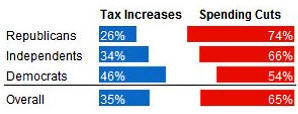With Zero Hour at Hand, a Total Impasse in Debt Ceiling Talks
Jul 13 2011That normally conciliatory President Obama stormed out of a debt ceiling meeting saying to House Majority Leader Eric Cantor, "Don't call my bluff", gives strong indication that there will be no resolution to the debt limit standoff. It looks like the United States is poised to default on its debts beginning August 2nd. By demanding some $2 trillion in budget cuts across 10 years in return for raising the limit, Republicans and the Tea Party freshmen among them are willing to trigger what Federal Reserve Chairman Ben Bernanke has warned will be a "huge financial calamity". This has led Moody's to join Standard & Poors in warning of a downgrade of the nation's triple-A credit rating.
The President had at first approved the deal struck by Vice President Biden for $2 trillion in cuts across 10 years in return for a token $130 billion in revenue increases brought about by steps such as eliminating tax credit subsidies to the major oil companies and requiring hedge fund principals to pay taxes on income on the same rate scale as the rest of us. Back then it was Eric Cantor walked out on the meetings, refusing even closing tax loopholes.
As shown in this latest Gallup poll

Obama's minimalist call for some tax revenue puts him to the right of Republicans at large, who think 26% is the right number.
Doctrinaire Democrats were incensed that Obama, as part of this plan, tossed “changes” in Medicare and Social Security into the pot, a signal that those on the left are as unwilling to face the mounting debt as those on the right are unwilling to solve the problem with so much as a dollar in tax “changes”.
With any agreement looking unlikely, Senate Minority Leader Mitch McConnell proposed to give Obama the right to raise the borrowing limit on his own, in three increments meant to span the remainder of Obama’s term, one of the President’s demands. McConnell intended for Congress each time to vote resolutions to refuse the three debt ceiling increments — resolutions that they assume the President would veto in order to prevent default. The offer expected the President to each time suggest budget cuts in the same amounts as the debt increases, but with no requirement to implement them.
These Kabuki theatrics were met with such outrage from his party that there was speculation that the offer would end McConnell's career. The Republicans' problem is that so many have made adamant statements that they would not permit the debt ceiling to rise without a budget cut deal, devoid of any tax changes to boost revenue, that now they are hoist on their absolutist stance, unable to climb down, and have set themselves up for the blame if the U.S. defaults.
So for his part, by giving the Republicans what columnist Paul Krugman called “an anti-Corleone…an offer they can’t accept”, Obama can point to the huge cuts he was willing to make, defusing charges against his own deficit budgets. For their not leaping at the chance of huge debt reductions, he can now paint the Republicans, not the Democrats, as the party of profligate spending when he hits the campaign trail.
We wonder what our bankers – China, that is – will have to say about all this.
Please subscribe if you haven't, or post a comment below about this article, or
click here to go to our front page.

